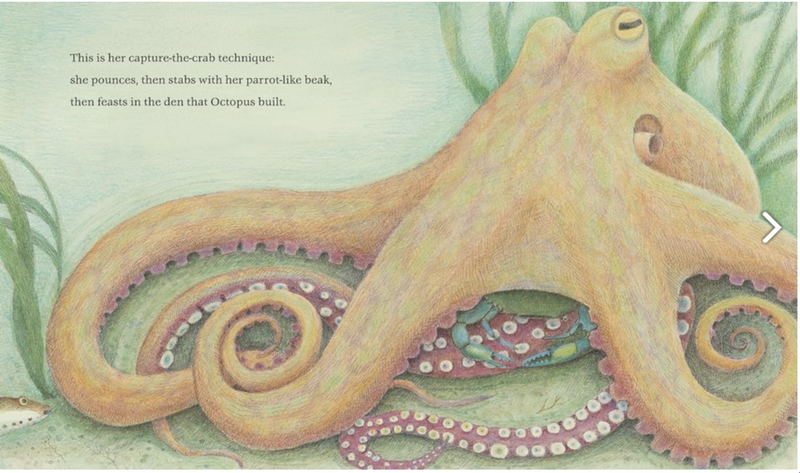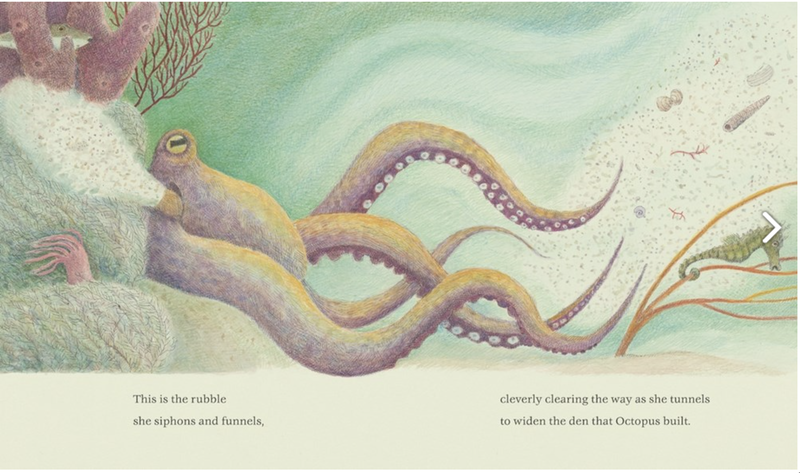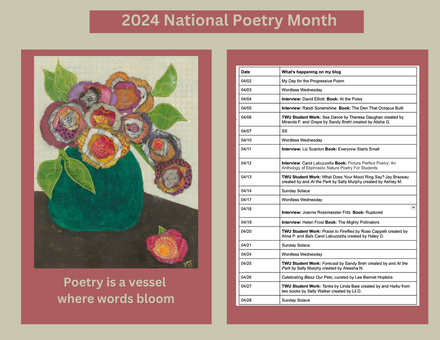 n Thanks to Irene at Live Your Poem for hosting the first Friday of National Poetry Month. The theme of my poetry month is 'doubleheaders". Double interview Fridays and double videos on my Saturday Matinees featuring my TWU students. World Aquatic Animal Day was April 3 so the first two books feature sea animals. Part II, is an interview with Randi Sonenshine and her gorgeous book The Den That Octopus Built. The book birthday is set for May 21, 2024. 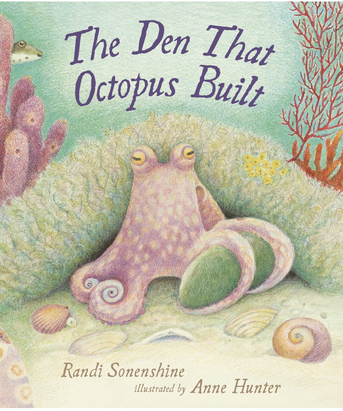 JRM: From a lodge built by a beaver to a den built by an octopus, how did you decide on the octopus to be the next book? RS: My agent, Kendra Marcus of BookStop Literary, called me one night and told me I had to watch My Octopus Teacher because it was going to be my next book. She was right, of course! I was spellbound! Octopuses are such fascinating creatures, and though we have learned a lot about them, there is still so much we don’t know. They have an uncanny intelligence and an almost universal appeal. Their dens, though not elaborate structures like the wren’s nest or beaver’s lodge, are unique and central to the life cycle of an octopus. JRM: Are you creating a series? What will be next? RS: I think there’s potential for additional books in the animal habitats series, but there are none in the works at the moment. Currently, I’m working on another project, also a lyrical exploration of one aspect of the animal world, but wholly different from this series. JRM: I am sure you researched octopi in depth. What information did you have to leave out? What was the most surprising tidbit of information from the research? RS: I try to integrate as much of my research as I can within the main text, but given that the text is poetic and spare, that's a challenge, which is why I include back matter. With this book, though, there was so much I wanted to include, I couldn’t fit it all in the back matter. I would love to have included more about their hunting techniques, which I find fascinating. I mention the pounce attack in one of the verses, but they sometimes even trick their prey by reaching all the way around with one arm to tap it. When the backs up, thinking the danger is in front of it, it backs right into the octopus, where it is quickly trapped in the webbing between the cephalopod’s arms. To add insult to injury, the octopus then injects it with a paralyzing neurotoxin from its beak. Of all the fascinating things I learned, though, the most surprising had to do with words. Like you, I always thought the plural of octopus was octopi, but it’s octopuses or octopus. JRM: Wow RS:It has Greek roots rather than Latin. Also, its limbs are not called tentacles. They are arms. Squids have tentacles, which are long and stringy with suckers only on their clubbed ends, while octopus arms are shorter, muscular, and have rows of suckers all along their length. JRM: I love the pattern from the classic This is the House that Jack Built. What was your process for getting the rhyming and the cadence to flow and to include the information about the octopus? RS: As this is the third companion book, the cadence is very natural to me. In fact, while I’m in the writing phase, I often think in that rhythmic pattern, even when I’m not actually writing! While I’m researching, I also jot down words, phrases, and sometimes lines that are evoked by what I’m learning. Those words and the meter are constantly percolating in my brain, and as phrases or lines come to me (usually in the car, the shower, or right before I fall asleep!) I jot them down in the notes app on my phone. I’m a stickler for meter and rhyme, so I will obsess over every syllable until these are perfect. Sometimes that means changing a word or phrase or inverting the two clauses that make up the couplet. Two absolute essentials during this phase of the work are RhymeZone and thesaurus.com. I also read the verses out loud over and over and have others read them aloud. If anyone stumbles over a line or forces the meter, I know it needs work. JRM: Research or create the rhymes? What is your favorite? RS: I love the research, but it can take me down a long and winding rabbit hole! Once I start to write, though, it’s such an exciting challenge. It’s like a puzzle; I need to find just the right “piece” to fit in that poetic space.I also love revising for other sound and meaning elements to make the text as musical and lyrical as I can. With each revision pass, I layer and refine elements like alliteration, assonance, figurative language, and sensory images to create something that’s rich in both sound and meaning. JRM: Was there a verse you wanted but had to cut? RS: I wanted to include a verse that showed her using a shell or some kind of vessel as a temporary shelter: This is the shell she squeezes inside/ a quick, makeshift shelter to rest in and hide/ while far from the den that Octopus built. Instead, I opted for the verse in which she uses shells around her as armor: These are the shells she wears like a sheath/ keeping her safe from Tiger Shark’s teeth/ when she’s far from the den that Octopus built. JRM: How can readers support our aquatic environments? RS:: That’s a great question! First, it’s important for readers to understand that the ocean supports humans, just as it does aquatic life. In fact, about ten percent of people in the world depend on the ocean for their livelihood, and there is a limited supply of that water. The easiest and most important thing we can do is use less water. Taking shorter showers, turning off the water when we brush our teeth, and making sure we don’t have leaks are all great ways to conserve water. Also important is reducing the amount of contamination in our oceans, especially plastics. Recycling, using reusable water bottles, and using less disposable plastics like take-out cutlery, straws, and containers will go a long way towards reducing this threat to our aquatic life. JRM: Thank you for your wonderful interview. I was unaware of the plural of octopus and that they are limbs. 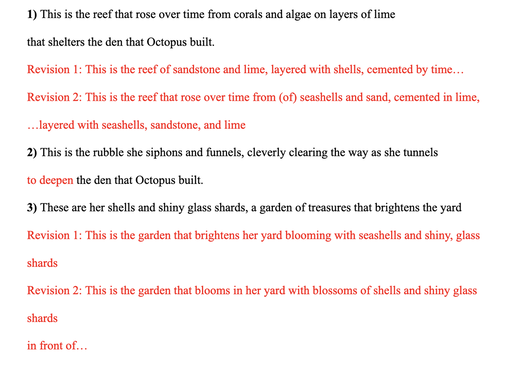 JRM: Would you have an early draft of a poem and then the final draft so readers can take a peek at the process? RS: Well, my process is (literally) all over the place! First, I jot down verses and partial verses in my notebook and/or on my brainstorming document on my computer, as well as in the notes on my phone, so I have snippets and scraps in multiple places before I stitch them together into a cohesive draft. Before I draft, I put the rough verses (usually multiple options) on color-coded notecards to help group them and determine the sequence, all the while playing with the language and sentence structure, so by the time I draft the manuscript, I have worked through a lot of revisions, and the changes after that are not as extreme. To show that evolution, I’ve added some of those early octopus “inklings’ to my first draft to share with you and your readers. Please stop by for the Double Feature Saturday Matinee featuring my TWU Students. And I host next Friday.
Irene Latham
4/5/2024 04:36:38 am
Yay for Randi's new book! I LOVE octopuses...LOVE, AGNES:Postcards from an Octopus remains one of my favorite book projects ever! I look forward to reading this. Thanks, Jone. xo 4/5/2024 08:15:24 am
Octopuses are fascinating and it's great to read of Randi's new book on the way, Jone. Thanks for the extra info about these amazing animals, love hearing about their tricky captures and seeing some of the revision examples. Thanks, Jone! 4/5/2024 10:02:27 am
Hi Jone,
Denise Krebs
4/5/2024 10:26:00 am
Thank you Jone, for sharing Randi S.'s interview. I am always charmed by a book following the pattern of "The House that Jack Built", so I'll be looking for this one. Thanks! 4/5/2024 01:20:46 pm
Another book I need to get a hold of! I love that Randi thinks in "the house that jack built" pattern while she's drafting. Thanks for a great interview. 4/5/2024 04:52:01 pm
I knew octopi were smart, but I learned some new facts! I can just envision the sneaky back tap. Can't wait to read the whole book! 4/6/2024 04:55:13 am
Ooh, I love octopuses! And Randi's wonderful cumulative picture books! Randi, I so feel your pain on leaving out or changing a verse, etc. I do love that octopuses hide inside coconut shells, etc., but the tiger shark's teeth verse is fabulous! Congratulations, and thanks for the insight, Jone and Randi!
Rose Cappelli
4/6/2024 05:01:13 am
Thanks for a great interview and a new title to pursue! 4/6/2024 07:58:56 am
Informative interview with an author who is fascinated by octopuses. I'd love to read this book. It was fun to see how the lines change with revision, which to me is such an engaging process. 4/6/2024 11:34:37 am
It's my goal to someday write a "This is the House that Jack Built" story! 4/7/2024 11:03:49 am
Wonderful interview - thank you both! (And those illustrations by Anne Hunter look gorgeous....) Comments are closed.
|
AuthorAll photos and poems in these blog posts are copyrighted to Jone Rush MacCulloch 2006- Present. Please do not copy, reprint or reproduce without written permission from me. Categories
All
Archives
July 2024
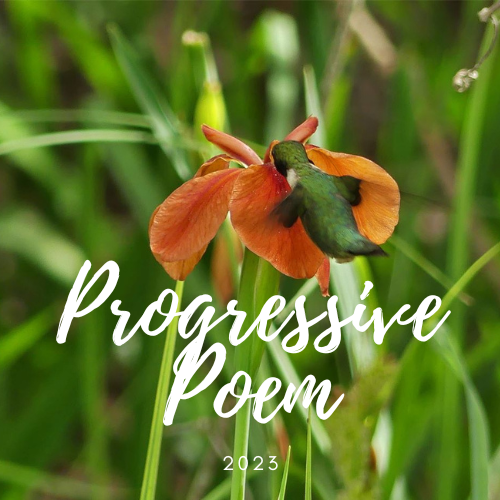
2023 Progressive Poem
April 1 Mary Lee Hahn, Another Year of Reading April 2 Heidi Mordhorst, My Juicy Little Universe April 3 Tabatha, The Opposite of Indifference April 4 Buffy Silverman April 5 Rose Cappelli, Imagine the Possibilities April 6 Donna Smith, Mainely Write April 7 Margaret Simon, Reflections on the Teche April 8 Leigh Anne, A Day in the Life April 9 Linda Mitchell, A Word Edgewise April 10 Denise Krebs, Dare to Care April 11 Emma Roller, Penguins and Poems April 12 Dave Roller, Leap Of Dave April 13 Irene Latham Live You Poem April 14 Janice Scully, Salt City Verse April 15 Jone Rush MacCulloch April 16 Linda Baie, TeacherDance April 17 Carol Varsalona, Beyond Literacy Link April 18 Marcie Atkins April 19 Carol Labuzzetta at The Apples in My Orchard April 20 Cathy Hutter, Poeturescapes April 21 Sarah Grace Tuttle, Sarah Grace Tuttle’s Blog, April 22 Marilyn Garcia April 23 Catherine, Reading to the Core April 24 Janet Fagal, hosted by Tabatha, The Opposite of Indifference April 25 Ruth, There is no Such Thing as a God-Forsaken Town April 26 Patricia J. Franz, Reverie April 27 Theresa Gaughan, Theresa’s Teaching Tidbits April 28 Karin Fisher-Golton, Still in Awe Blog April 29 Karen Eastlund, Karen’s Got a Blog April 30 Michelle Kogan Illustration, Painting, and Writing |
